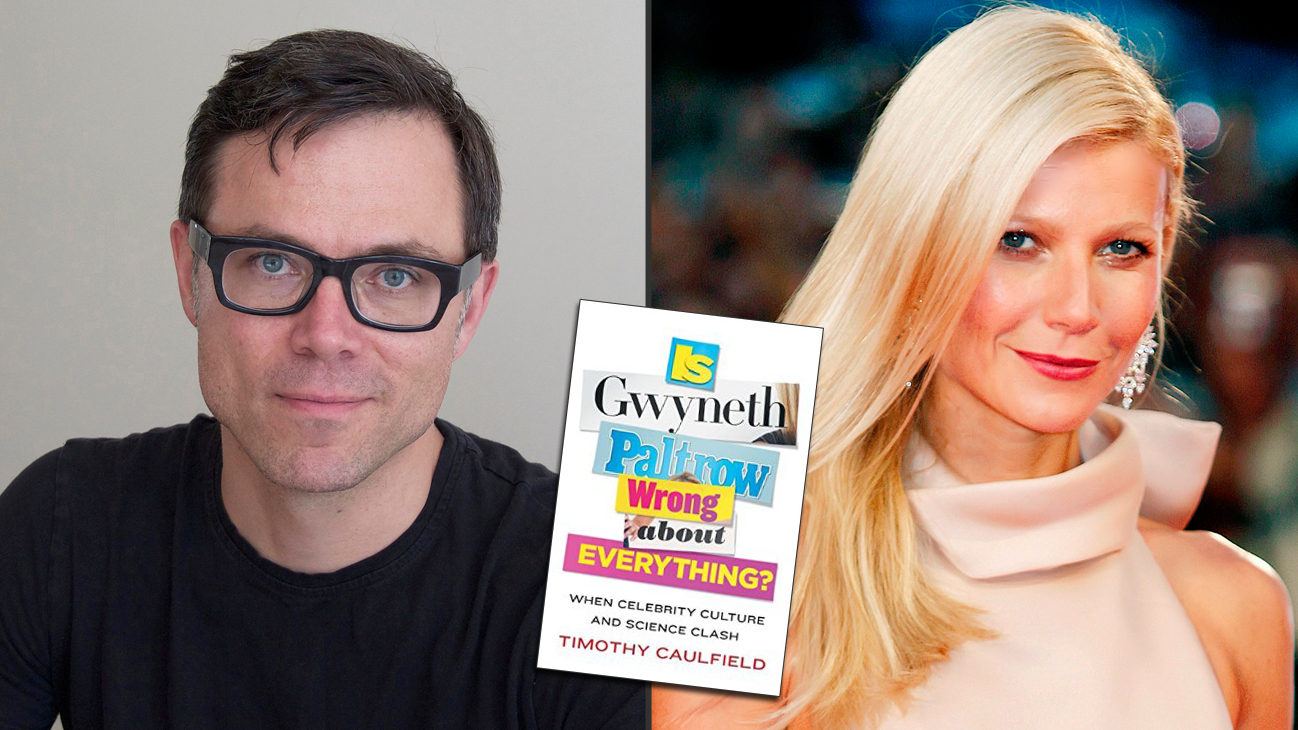Over the past few decades, celebrity culture’s grip on our society has tightened. For Timothy Caulfield, a celebrated author and health science expert who is a University of Alberta professor and a Canada Research Chair in health law and policy, this culture has a measurable influence on individual life choices and health-care decisions. While acknowledging the pervasiveness of celebrity culture, Tim doesn’t mock those who enjoy it (in fact he loves celebrity culture), but with a skeptic’s eye and a scientific lens, he identifies and debunks the messages and promises that flow from the celebrity realm, whether they are about health, diet, beauty, or what is supposed to make us happy. The Canadian Press spoke with him about his new book, Is Gwyneth Paltrow Wrong About Everything: When Celebrity Culture and Science Clash, below:
Timothy Caulfield insists he’s not a Gwyneth Paltrow hater.
In his new book, “Is Gwyneth Paltrow Wrong About Everything: When Celebrity Culture and Science Clash,” the Edmonton-based health science expert debunks diet and beauty claims made by the Oscar-winning star and others as he examines how popular culture twists science.
Caulfield says he thinks Paltrow is a great actress, and he loves some of the projects she’s been in.
But he focused on her, and her Goop lifestyle brand, because she’s the “perfect emblem of the place of celebrities, particularly in the context of health and beauty and lifestyle, because not only does she provide all these recommendations, but it’s part of her brand.”
“I think given that she is sort of explicitly saying that she is an expert or holding herself out as an expert, it’s fair to hold her to some kind of standard, and I think the standard should be science,” Caulfield said in an interview.
“The other thing with Gwyneth is, she just says such crazy things, like the ‘V-steam,'” he added. “That’s just gold, I can’t make that stuff up.”
The renowned professor, lawyer and father of four went to great lengths to research the lure and impact of celebrity culture, as well as stars’ views on topics including organic- and gluten-free food, vaccinations and cosmetic surgery.
He tried out for “American Idol,” went on a 21-day detox recommended by Goop, attended a modelling convention and tried an expensive facial regimen for nearly a year.
He also examined various studies and spoke with health and science experts as well as celebrities, including Alison Arngrim (a.k.a. Nellie Oleson of “Little House on the Prairie”), who told him: “If you are unhappy, getting famous is the biggest mistake.”
Caulfield said he wrote the book partly because he’s noticed, over the last couple of decades, an increase in interest in celebrity culture as well as the impact of the rich and famous “on health, on how we view ourselves, on notions of beauty and even on our aspirations.”
“I think there’s a bunch of stuff going on. One of the things is social media. I think more than any other time in history, people feel closer to celebrities, and the idea of becoming a celebrity seems more possible,” he said.
Caulfield, author of 2011’s “The Cure for Everything,” said he’s “a huge fan of celebrity culture” but admits a fixation on it can be “less than constructive.”
“But look, it’s not going away and so I think we need to grapple with it and understand what’s going on,” he said. “I also think we need to get … more evidence-based discussions to happen in social media to counterbalance what we hear from celebrities in various areas, like vaccination, for example.”
Caulfield comes to some sobering conclusions.
Among them: cleansing and detoxing are unnecessary and have no science to back them up; most over-the-counter beauty products don’t work; and the chances of becoming a celebrity are “vanishingly rare” and “when it does happen, it’s almost always based on luck.”
“Some people say, ‘Your book must be a downer! The dream-crusher, right? Nothing works and no one is going to become famous, really,'” he said.
“I don’t think that’s the case at all. I hope that it’s kind of liberating…. Understand that becoming famous is not a realistic goal.”
Caulfield’s book is out in Canada and hits shelves in the U.S. in May.
He said he’s reached out to Paltrow to interview her but hasn’t heard back, and he doesn’t know if she’s read the book.
If he does get a chance to speak with her, he said he wants to ask: “Do you really believe all the stuff that you say?”
“I suspect she does, but I’d love to hear her response to something like that.”

